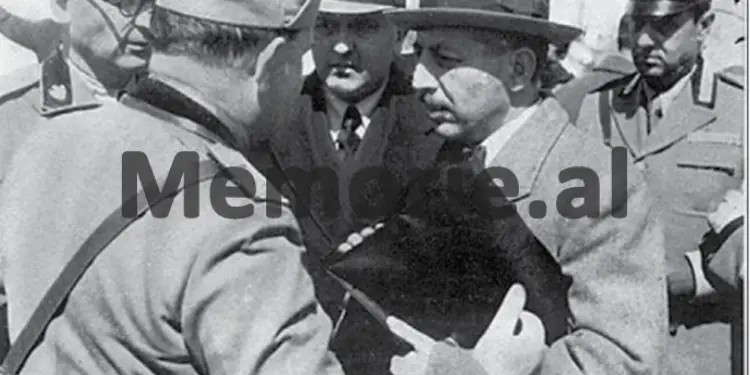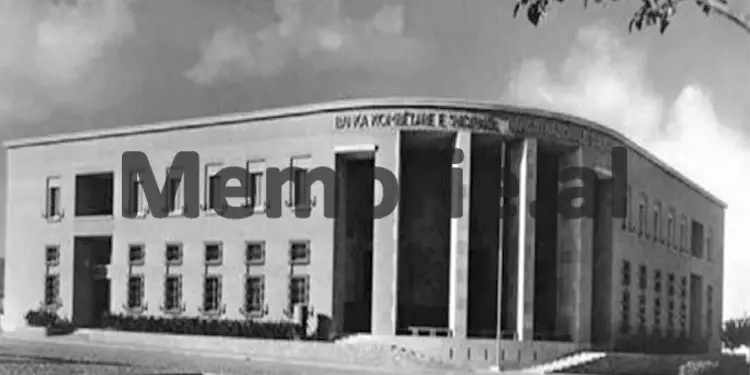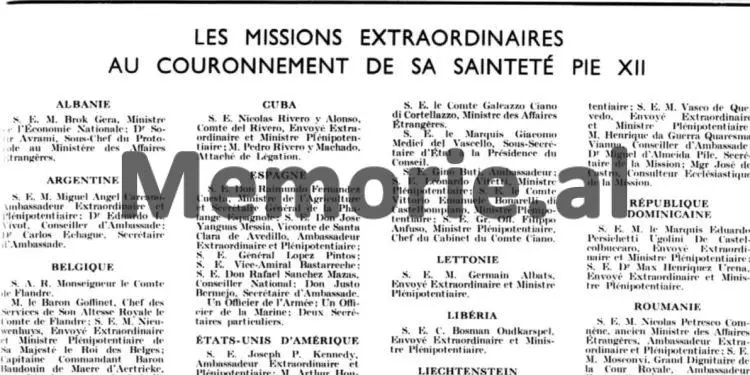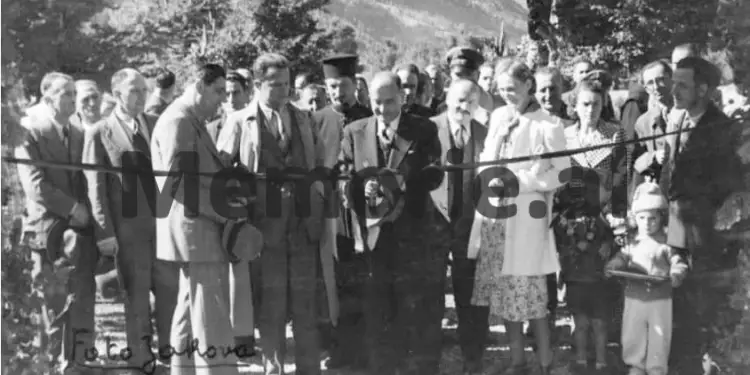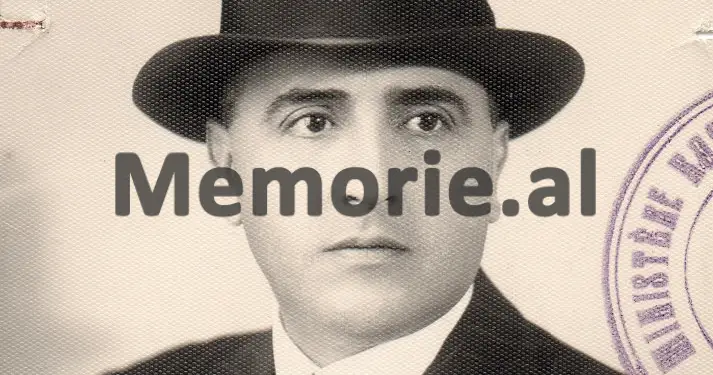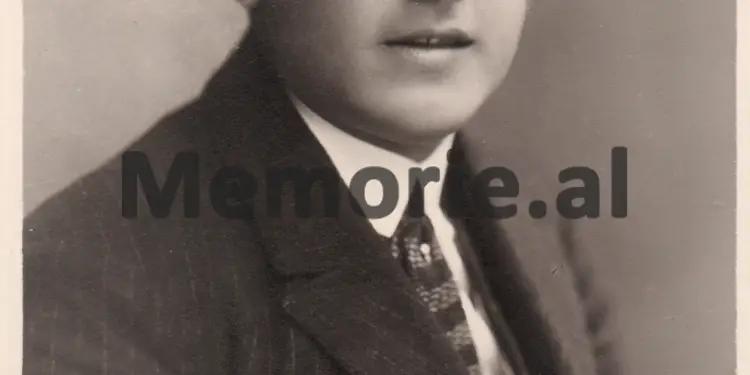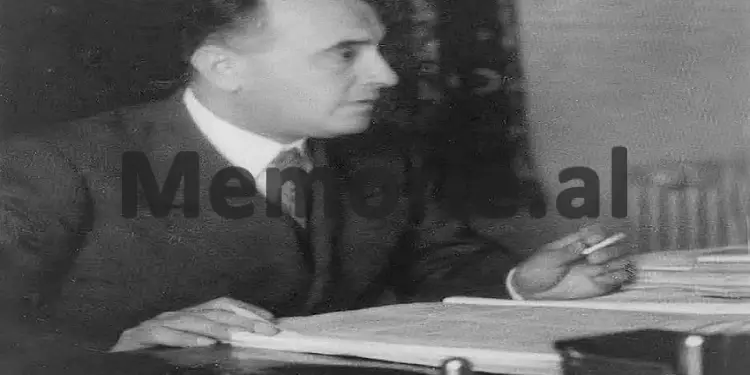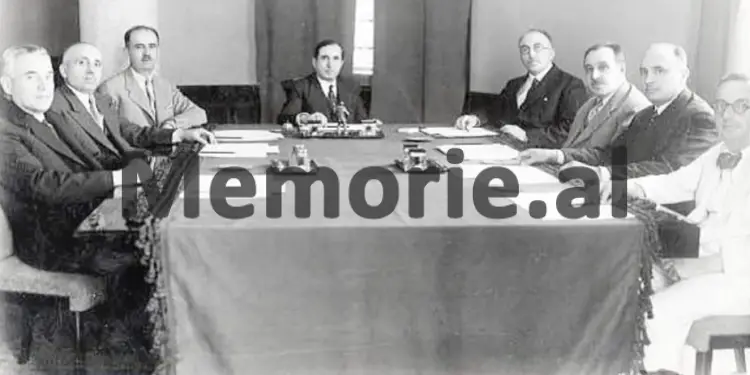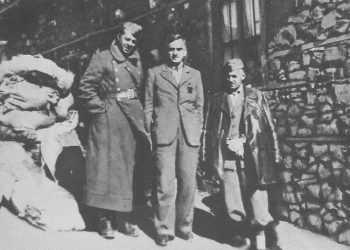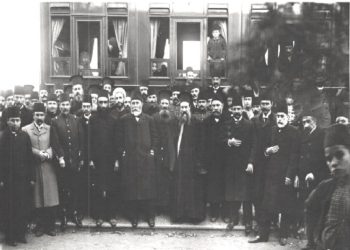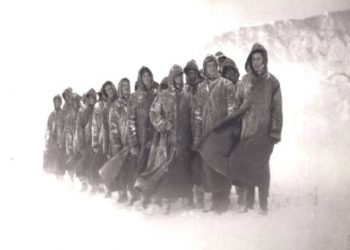By Arben Pustina
Part fourteen
-Rrok Gera, a proper statesman –
FORWARD
Memorie.al / This book aims to convey to the public the image of a perfect man, who lived in other times, but who was the best example, not only of what an ordinary man can represent, but, next first, as an example of a noble, distinguished, omniscient and, above all, honest statesman. Having in his genes the noble virtues of his origin, being formed as a personality in a wonderful environment, such as Shkodra at the beginning of the 20th century, and graduating from one of the most prestigious universities in Europe, such as that of In Vienna, Rrok Gera had all the potential to be one of the important figures who gave rise to a rapid development through comprehensive reforms in Albania in the 30s of the last century.
This development reached its peak with the government of Mehdi Frashër, considered perhaps the best Albanian government of all time, formed for the most part by non-political persons, among who was Rrok Gera. For 10 years, or more, as a minister or in other high state functions, he worked with conviction that he was walking on the right path for the consolidation of the Albanian state, a process for which he said he had no time to lose. Economist, financier, diplomat, lawyer, Gera was a specialist who advanced towards the top with his professionalism in an environment where the old factions, which were almost dominant in politics and governance, lost ground in front of young and educated people good.
Continues from last issue
MINISTER OF NATIONAL ECONOMY IN THE GOVERNMENT OF KOÇO KOTA
After affirming the great challenge facing the economy at that time, Gera, in his speech before the microphone of the newly inaugurated Radio Tirana, noted that the national economic development would be achieved through a harmonious organization and a careful mobilization of of all production factors, as well as from the assessment that would be made to Albanian products, through internal trade and export to foreign markets. Above all, Gera emphasized, a lot of work is needed, because nothing can be achieved by itself, let alone the well-being of the homeland. In the framework of the reforms that the government had at the center of its work, the Ministry of National Economy continued the work on the drafting of draft laws for various sectors of the country’s economy.
Towards the end of 1938, Minister Gera presented to the Parliament the draft law on the issuance of certificates of origin, by means of which it was intended to curb the speculations coming from the trading of foreign goods, which were sold as Albanian goods, bringing a loss great for Albania’s economy. For example, in the trade with Italy, the import of our goods in this country was limited to certain quantities and any trading of foreign goods, as if they were Albanian, caused our goods to remain unsold, and as a result, there was a decrease of their price.
In the justifying report on this issue, Rrok Gera emphasized that the issuance of certificates of origin would be a necessary measure, as otherwise, the consequences would be very serious, not only for honest traders, but also for Albanian exports as a whole, for local producers and for the entire economy of the country. The draft law on the issuance of certificates of origin determined that all goods that were re-exported without any transformation, or any “perfecting work”, would not be called goods of Albanian origin, even if those items were “naturalized” or not with the payment of customs duties and, as such, these goods could not be provided with a certificate of origin. The bill provided that certificates of origin would be issued only by the Chambers of Commerce of the Kingdom, or even by any state office designated by the Ministry of National Economy. In case of abuse by officials in issuing such certificates, the law provided for penalties ranging from heavy fines to imprisonment.
Also, the draft law provided that, after the entry into force of the law, every week, the list of certificates of origin that were issued for that period of time should be sent to the Ministry of National Economy, which should contain the notes for each certificate, where to include: type, brands and number of packages of the goods, gross and net weight, value of the goods, number of shipping companies, name of the ship carrying the goods and date of departure from the port of the Kingdom, cost of transport and name of the port of foreign country where the goods would arrive, the customs decision where the customs clearance would take place, as well as the place of deposit of the goods.
In a letter dated 05.01.39, addressed to the Presidency of the Council of Ministers, Rrok Gera requested the annulment of one of the points of the decision of the Council of Ministers no. 1098, dated 24.09.1938, which stated that, the permits for foreign citizens who wanted to exercise their activity in crafts, commerce, or industry, in Albania, would be granted only by the Ministry of Internal Affairs.
In his letter, Minister Gera underlined that before, for the granting of these permits, the Ministry of National Economy had to be asked. He noted, meanwhile, that there was a law of March 14, 1934, that disciplined the granting of permits for crafts, trade and industry, based mainly on the principle of reciprocity. According to Rrok Gera, for the Ministry of National Economy, it was very important to have its say in granting permits to foreigners:…”
In particular, we must emphasize that granting trade permits to foreigners is one of the most important competences of this Ministry, which has formed a special criterion for the regulation of this issue. Then the granting of a trade permit must also comply with the relevant provisions of the Commercial Code, the Law and the Regulation on the establishment of Chambers of Commerce, in terms of the notifications that a trader must give, which is very important, especially for as for the foreign nationals, who come here with the purpose of speculating for a short time, thereby dishonoring the honest name of the Albanian merchant.
Further, Gera clarified that his request applied specifically to permits related to trade and industrial activity, and had nothing to do with permits for foreigners seeking to practice other professions such as: doctor, lawyer, etc., etc. , and this was, (as it was written in the letter) and the essence of his position as a minister, at the time when this issue was discussed. As the years passed, with the growth of industrial economic activity in Albania, especially in the mining sector, the need arose to regulate by law the entire wide range of workers’ rights and all the problems that had emerged from the vacuum related to them until then.
There were also articles on this issue in the press of the time, and one of them was an article in the “Stypi” newspaper, dated December 22, 1938, titled “For the work side”, reflected in the “Hylli i Drita” magazine: ” …Among us, there is no special law like in other countries, which recognizes the social legal status of the workforce to the extent that it produces and takes a living part in the construction of our society. These rights are simple as the life of this workshop is simple. An improvement in working hours, an insurance for the worker in case of calamities and some arbitration in matters of placement or minor and ordinary conflicts between the employer and the worker. These are some of the rights, but they are the most important and were established and recognized in the world half a century ago…”.
While noting that the efforts for law and order for the rights of workers might not be well received by those who wanted to work in this direction, the “Stypi” newspaper emphasized, meanwhile, that the state should act by providing a solution to this issue. Based on this goal, in March 1939, Minister Gera forwarded to the Parliament for approval the draft law on the creation of the Directorate of Labor under this Ministry. In the justifying report that accompanied the draft law, it was emphasized that with the development that various businesses and industries had taken at that time, especially mining, it was necessary to take measures for the establishment of a competent office for the protection of workers’ rights.
Based on the draft law presented to the Parliament, the new structure was tasked with preparing draft laws and regulations for the improvement of the workers’ condition, overseeing the implementation of the provisions of the labor law and relevant regulations related to working conditions. and with the state of workers of each category, to plan the opening of state offices for the employment of the unemployed, to intervene whenever the need arose to resolve disputes between employers and workers, to look at the state of workers in general, etc. On March 12, 1939, Rrok Gera went to the Vatican as a representative of Albania, accompanied by dr. Sotir Avrami, Deputy Head of Protocol at the Ministry of Foreign Affairs, where, among delegations from 35 different countries of the world, he participated in the coronation ceremony of Pope Pius XII organized in the Vatican.
THE LAST ATTEMPT TO AVOID THE FASCIST OCCUPATION
In support of the idea that it was not the policies followed by the Albanian authorities against Italy that brought about the invasion of the country, but the plans and scenarios for the start of the World War, we quote here Antonio Moscato, who in his article entitled “La memoria Storica che manca agli italiani”, with the subtitle “April 7, 1939: Italy invade Albania”, asserted that “the policies of economic penetration and corruption of local leaders (in Albania – my note, A.P.), which had started at least 10 years before the advent of fascism and continued until 1938 on the same lines, they had not had any significant success”.
Moscato also claimed that Roberto Morozzo Della Rocca, one of the most attentive researchers of the history of Italian-Albanian relations, had written that … “the economic concessions and the network of interest created by the Italians in Albania did not translate into a parallel growth proportional to the political influence nor in a strategic control”. Also, Prof. Dr. Francesco Guida, in his article entitled “The Kingdom of the Bird, seen in the light of Italian diplomatic documents”, emphasized: “…it is known that the decision to invade Albania in April 1939 was made mainly due to international circumstances, specifically because of the answer Mussolini had to give to Hitler’s fait accompli, regarding the invasion of Bohemia [1] Moravia”.
However, at the beginning of 1939, Rome had already decided to invade Albania. The representative of Italy in Albania, Jakomoni, wrote in his memoirs that the day before the Italian landing, on April 6, Libohova, Minister of Foreign Affairs, and former Prime Minister Frashëri, brought him a proposal, where “the drafting of a Convention was accepted Military, where the conditions were determined, with which the Albanian government would allow the landing of Italian troops”. The proposal called for the convention to end with General Parian. In his telegrams 5553/83 p.r. and 5557/84 p.r., dated April 6, at 20:20, addressed to Foreign Minister Çiano, Jakomoni also emphasized that: “Mehdi Bey, former Prime Minister, with his hostile behavior, certainly did not contribute to well while giving me the proposal without any sign of kindness. He (he clearly has the full support of the King) will certainly contribute to making the situation worse, and I am convinced that after this evening’s talks, he will be largely credited if the resistance of armed Albanian will be even tougher”.
The answer forwarded to Jacomoni by the Italian Ministry of Foreign Affairs was as follows: “…If the Albanian government has something to say, communicate it to the commander of the troops, before the landing takes place and the commander of the troops will notify Rome”. As part of this response, the Italian representative in Albania, in the early hours of the morning of April 7, received another telegram from Mussolini to forward to King Zog, in which it was said that he could send to Durrës a plenipotentiary representative for negotiations: “…In the spirit of the Italian-Albanian friendship you mention, to which I will remain loyal, I inform your majesty that you can send your plenipotentiary representative to Durrës to discuss the military agreement with General Guzzoni, commander of the Italian troops, authorized by me to hear your representative and then notify me”.
Meanwhile, the highest dignitaries of the Albanian state were constantly gathered at the house of Prime Minister Koço Kota, to discuss the situation and the measures that had to be taken. Rrok Gera himself was for endurance. “Let’s put the rifle to them”, he had called, while discussing how to react in response to the Italian ultimatums. Months later, in the summer of 1939, one of Queen Geraldine’s friends, the Hungarian baroness, Suzanne de Strasser, wrote for the American press her memoirs about the Albanian Queen, which were published under the title “The Romance of Geraldine-the Cindarella Queen”, where, in addition to many others, she extensively described the events of April 1939.
Although she has given her memories a somewhat literary tone, Strasser conveys quite truthfully the course of events, the details and the characters of the drama of those days, including Rrok Gerën. In the following fragment, taken from the memories of the baroness, it is clear exactly Gera’s firm position to resist the Italians with weapons: “…During the afternoon, the King received one of the government ministers, who had asked to talk with him.”Where are the others?” – Zogu asked Rrok Gera, Minister of Economy.
“Where? Who can say? Where do time and the tide take him…”? “Good”, – said the King. – “But the situation requires some answers”. “To weapons and horses, you’re Majesty. Let’s face the Italians, just like you said last night.” “I was busy last night,” the King raised his voice. – What would be the benefit of this? I was crazy last night, or to put it another way, it was a person twenty years younger who was talking. How can we cope with these new planes? It was different when fighting gallantly, hand to hand.” – And the King raised his head to show the warplanes buzzing in the sky.
As the “New York Times” newspaper of June 24, 1939, p. 12 wrote, it was the baroness who had announced to the American press that King Zog together with Geraldine and their little son (who at that time were residents in Istanbul), they would make a long visit to the USA in a few weeks. It was a long conversation, my people told me. Until the end, Minister Rrok Gera insisted on a firm stance and war, as well as another appeal to England…”.
After long discussions, the highest Albanian authorities, who as we said had gathered at the Prime Minister’s house, decided that the Minister of National Economy, Rrok Gera, accompanied by the colonel of the General Staff, would go to Durrës to negotiate with Guzzoni. , Sami Koka, and the Italian military attaché in Tirana, Colonel Gabrieli. It seems strange that a person who was neither a military commander nor a foreign minister, but a minister of economy, was appointed for this mission, but this was not a coincidence. Rrok Gera, even though he was the youngest in age, had the trust of everyone, he had the ability to negotiate even with the commander-in-chief of an army that was landing thousands of armed soldiers, he had the culture, the character and, above all, he had the loyalty to carry out such a delicate mission.
It is unfortunate, meanwhile, that this mission, which was a real attempt to avoid the invasion of the country, has been written in a deficient, inaccurate and prejudiced manner. This is what an accredited ambassador in Tirana wrote in his reports on April 7, 1939, and this is how well-known local and foreign historians, writers, journalists, etc. wrote later. It is true that regarding this moment there is not much documentation in Albania, but the Italian side has recorded everything in detail and it is not about any propaganda sector of the Fascist Party or the Italian Ministry of Foreign Affairs, but about the documents of the Diary of Italy’s Supreme Command, based on Guzzoni’s own reports on April 7.
Let’s go back in time to see how Operation OMT began; the final order to launch was given at 17:30 on 6 April. Most of the warships designated for landing left Brindisi at 6:30 p.m., while the cruisers left the coast of Italy shortly after midnight. In one of them, the cruiser “Fiume”, was the Italian commander-in-chief Guzzoni. While traveling, at 02:00 on April 7, he received telegram no. 87780 with Mussolini’s order to wait for the Albanian negotiators, if they had appeared in the port, but as the hours passed,
after the ships had entered the waters of Durrës, the general was informed that King Zog’s negotiators were not there!/Memorie. al
The next issue follows




